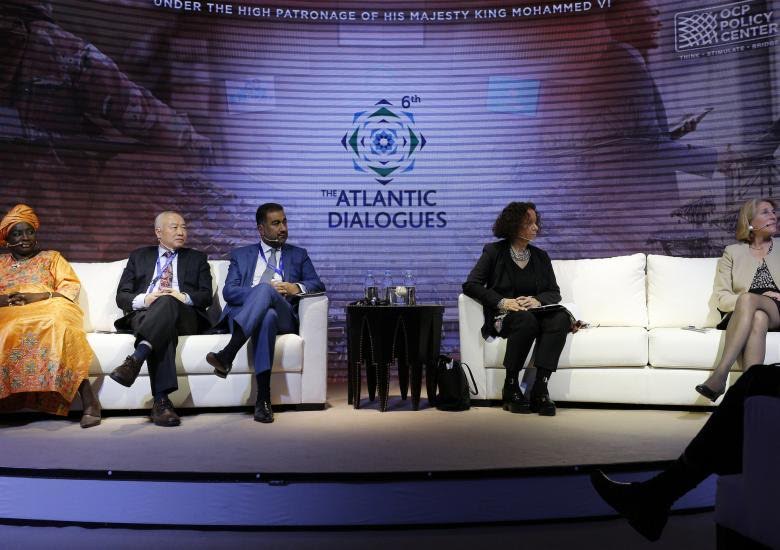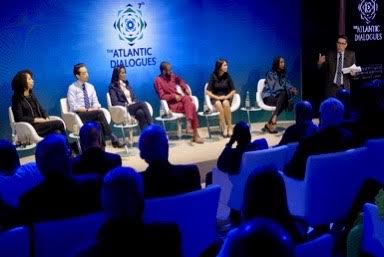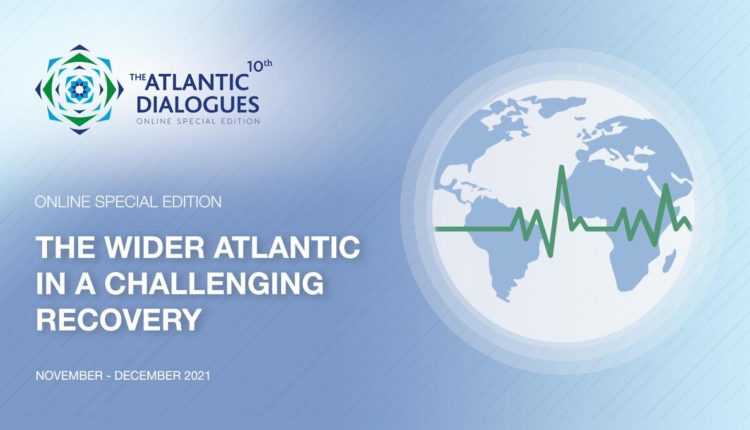Two first panels address the « Challenges of Governance in Times of Pandemic » and « Multilateralism in the Construction of a New World Order ».
The Policy Center for the New South launched the 10th edition of its high-level international conference Atlantic Dialogues on November 1st, on the theme of « The Wider Atlantic in a Challenging Recovery » from the Covid crisis. The 20 sessions are organized in the form of webinars, which can be accessed online on the Policy Center’s Facebook, YouTube and Atlantic Dialogues pages.
In his opening remarks, Karim El Aynaoui, President of the Policy Center for the New South, highlighted the « challenges for macroeconomic policy at the global level: the change in international law, the increasing rivalry between China and the United States, the competition between Arab, African and Asian powers that is changing the political landscape. These changes do not only affect the South Atlantic but also its classical transatlantic partners ».

+ The challenge of governance in times of pandemic +
The opening discussions conducted on November 1st focused on « the challenge of governance in times of pandemic », with Ana Palacio, Paulo Portas and Hubert Védrine, former foreign Ministers of Spain, Portugal and France, as well as Obiageli Ezekwesili, former Nigerian Minister of education, co-founder of Transparency International and Senior Economic Advisor to the Africa Economic Development Policy Initiative (AEDPI). In reply to two main questions on how governments respond and the role of governance in overcoming the pandemic, the speakers provided analyses marked by a great diversity of views, in the spirit of the Atlantic Dialogues.
« The Covid-19 is a global problem and international solidarity has not been effective », said Obiageli Ezekwesili. She called for rethinking multilateralism. Ana Palacio, for her part, considered that the Covid is « only one crisis, and there will be others ». According to her, the pandemic « has been an eye-opener, especially of populism, with leaders like Donald Trump and Jair Bolsonaro who have shown arrogance and even smugness. A devastating situation has emerged in Latin America. We have seen the infiltration of China into the multilateral system, and the incompetence of the European Union, where intra-European egoism has emerged ».
For Paolo Portas, « very few governments have managed the pandemic well, such as South Korea, Taiwan and Singapore, countries that had already faced the SARS. While Europe, an ageing society, has suffered a lot, Africa is young and has shown a greater pandemic memory ». Hubert Védrine, for his part, considers that it is « exaggerated to speak of a failure of governance », and believes that « multilateralism cannot impose decisions on powerful countries ». However, he called for a global evaluation of the management of the pandemic, which the World Health Organization (WHO) « could lead despite its shortcomings ».

+ Multilateralism in the construction of a new world order +
Moderated by Andres Schipani, Financial Times correspondent in Nairobi, the November 5th panel featured Paolo Magri, Director of the Italian think tank ISPI and Younes Abouyoub (Morocco), Director of « Governance and State-Building » for the MENA Region, United Nations, who discussed the state of multilateralism.
« My country first », was everyone’s approach during the pandemic, stressed Paolo Magri. Everyone sought to promote their own interests first. This global crisis has occurred amid the transformation of a world dominated by the West as we know it. China and Russia are now converging, which was unthinkable 20 years ago. Today, for several reasons, we are pushing Russia into China’s hands, and other countries may well join it ».
As to Younes Abouyoub, he thinks that this transformation does not offer a real alternative: « We no longer have two ways of viewing the world as we did during the Cold War, but a form of competition between two types of nationalism. Switching from one domination to another is not a solution. The economy is not seen as being at the service of development, and the world is not considered as a common good ».
The other 18 sessions of the Atlantic Dialogues, scheduled for November and December, will range from geopolitics to economics, looking at climate change and public health concerns in the global South.
The Policy Center for the New South (PCNS) is a Moroccan think tank aiming to contribute to the improvement of economic and social public policies that challenge Morocco and the rest of Africa as integral parts of the global South.
As such, the PCNS brings together researchers, publishes their work and capitalizes on a network of renowned partners, representative of different regions of the world. The PCNS hosts a series of gatherings of different formats and scales throughout the year, the most important being the annual international conferences “The Atlantic Dialogues” and “African Peace and Security Annual Conference” (APSACO).


